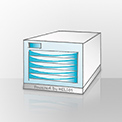HELIOS Tech Info #083
Mon, 05 Jul 2004
Using HELIOS products on SuSE 9.1 Linux with kernel 2.6
HELIOS has completed compatibility testing with the new SuSE Linux 9.1 Professional release. The HELIOS 4th generation products (CD020) are qualified for use with the SuSE Linux 9.1 products. Please note that it is already based on the 2.6 kernel.
During testing we have found three possible issues.
EtherShare Admin can only add one group to a user
The number of groups a user may belong to (NGROUPS_MAX), is on most other UNIX systems set to a value between 8 to 32. On SuSE 9.1, probably on any Linux with kernel 2.6, this value is set to the maximum of 65536.
As a result, in EtherShare Admin, it will not be possible to add more than one group to a user.
In order to use EtherShare Admin to administer users you will need to set this parameter to a lower value, for example
32.
Login as user “root” to the SuSE 9.1 Linux server with a shell and check the current value of “ngroups_max” with:
cat /proc/sys/kernel/ngroups_maxIn case its value is 65536, change it with:echo 32 > /proc/sys/kernel/ngroups_max
Then verify again with “cat” that the lower value is set.
In order to let EtherShare recognize the changed value you need to stop and start the “admsrv” using:
$HELIOSDIR/bin/srvutil stop admsrv
followed by :
$HELIOSDIR/bin/srvutil start admsrv
As the default value is set during every reboot of the server, you will need to adjust the parameter after each reboot with above “echo” sequence.
You could for example save an UNIX shell script to adjust the “ngroups_max” parameter during every start of the HELIOS services.
Copy / paste the following three lines into that script:
#/bin/shecho 32 > /proc/sys/kernel/ngroups_maxexit 0
Then save it as “90changengroups” in “$HELIOSDIR/etc/startstop” and make the file executable with
chmod a+x 90changengroups.
In case you only use PCShare you need not change the “ngroups_max” setting. The “pcadmin” program is not affected by the large value.
HELIOS "machid" program may not recognize the HELIOS dongle
During first tests, the HELIOS “machid” program did not recognize the HELIOS dongle when it was added after the machine had booted.
Instead, “machid” would show a machine ID of “00000000-bb”.
Only if the dongle was present before the server was booted, “machid” did recognize the dongle and did show the machine ID correctly.
In case you encounter a similar issue, make sure that the dongle is properly added before the server is booted.
WebShare Login with WebShare File Server set to “localhost” can fail
If there is an error message like:
"Cannot connect to server:java.io.IOException: Socket connect to localhost failed, error:Connection refused", the server is setup to use IPv6.
Instead of using “localhost” you can use either the IP number of “localhost” (127.0.0.1), the real host name of the server (e.g. “mywebshareserver”), or the DNS name of the server (e.g. “mywebshareserver.mycompany.com”).
Another option would be to specify “WSHostName” for the WebShareWOA server, so that the “WebShare File Server” field contains by default that name instead of “localhost”.
You can set this preference by means of “prefvalue”. Change to “$HELIOSDIR” and then enter:
# bin/prefvalue -k Programs/websharewoa/WSHostName -t str# "mywebshareserver"
Thereafter a stop / start of “websharewoa” is required to activate that change:
# $HELIOSDIR/bin/srvutil stop websharewoa# $HELIOSDIR/bin/srvutil start websharewoa
Another option could be to specify a Java preference so that the Java engine does prefer the IPv4 stack:
# $HELIOSDIR/bin/prefvalue -k Programs/websharewoa/java.net.preferIPv4Stack -t bool true
Thereafter a stop / start of “websharewoa” is required to activate that change.
As soon as new information becomes available, this will be distributed by a follow up to this Tech Info.

 Enterprise Server
Enterprise Server
 Developers / SDK
Developers / SDK
 Retail / Industrial
Retail / Industrial
 Newspapers / Publishers
Newspapers / Publishers
 Photographer / Studios
Photographer / Studios
 Ad Agencies / Premedia / Printers
Ad Agencies / Premedia / Printers
 Video & Entertainment
Video & Entertainment
 Cloud Collaboration
Cloud Collaboration
 HD Color
HD Color
 Image Processing
Image Processing
 Proofing
Proofing
 WebShare Connectivity
WebShare Connectivity
 Workflow Automation
Workflow Automation
 File Server
File Server
 Press Releases
Press Releases  Videos
Videos  Newsletters
Newsletters  Events
Events